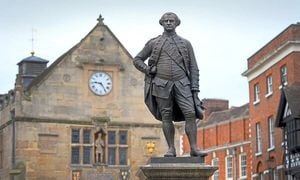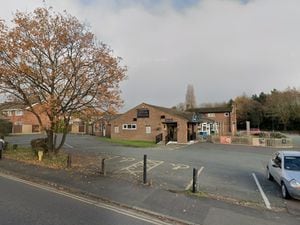For and against: Star readers have their say on Shrewsbury's Clive of India statue
Shropshire Star readers have been weighing in from both sides as the argument rages about what should happen to Shrewsbury's statue of Clive of India.

Debate has raged this week over the monument in Shrewsbury's Square after a statue of slave trader Edward Colston, which stood in Bristol, was toppled and dumped in a bay by protesters on Sunday.
Clive played a key role in conquering swathes of India for the East India Company in the mid-18th century.
Vote in our poll:
Commenting on shropshirestar.com, reader Terry said: "Statues are to honour people. Knowing the history of Clive, people need to carefully question their reasons for wishing him to remain in today's world."
SoapBoxJohn said: "These statues were deemed important enough to be designed and placed by our forbears, so we should respect that, else we forget who we are."
But Cranberry replied: "They belong in a museum, along with other relics of the past. We don’t have to agree with our forebears on everything - times change. They were free to pick the hero figures they wanted for their times, so why should we not be allowed to do that?
Watchdog wrote: "The Clive statue is a remnant from history. The things he did are hardly celebrated when so few people even knew about him until the other day. Wouldn't it be nice if all of those people who have signed petitions were just as passionate about homelessness or mental health, or care of the elderly?"
The Fat Controller's view was: "Corruption and looting saw Clive accrue a huge wealth - just the sort of person we want memorialised on a plinth. Imagine if it were Robert Mugabe - I wonder what the right-wingers would be saying then?!"
Zen said: "If it is that offensive put in a museum. Personally it is part of our history and I would prefer schools were taught history properly which includes the good and bad things such people did."
Andrew3 wrote: "To remove these statues removes the reminders of the past and removes the opportunity to reflect on the wrongs of the past and move on."
STBO said: "We've always denied our history. I was taught that Clive was a hero but he wasn't was he? I was taught about great victories in our pursuance of an empire but we were never taught that we were invaders. We have an evil murderous history.
The debate continued on Facebook, where Sarah Cartwright commented: "People who signed the removal petition most aren’t even local, it’s gone national. It’s still the minority of Britain want them gone."
Susan Po Grant wrote: "If Wroxeter is a learning tool that was built on the slavery and invasion of the Italians into the UK, why can't the statue remain but with a plaque explaining who he was and what he did, because I had not got a clue who he was until I saw this post?"
Neil Evans' take was: "No one looks at these statues and thinks 'When I grow up I want to be a slave trader'. It's not encouraging race conflict or encouraging racial hatred."
Continue the debate in the comments section below.
In brief: Who was Robert Clive?
Clive was born on the Styche Hall estate, near Market Drayton, in 1725 and went to school in London before travelling to India with the East India Company in 1743.
After two years in Britain, in 1755 Clive returned to India and two years later retook Calcutta (now Kolkata) for the company at the Battle of Plassey, a key moment on Britain's path to controlling Bengal and then India for almost two centuries.
Corruption and looting saw Clive amass a huge amount of wealth and he returned to Britain in 1760, aged 34.
He was made Baron Clive of Passey, knighted and became Shrewsbury's MP, a position he held until his death.
He went back to India in 1765 for two years before returning to Britain where the activities of Clive and the East India Company in India came under sustained attack.
The famine of Bengal that lasted between 1769 and 1773 and killed around a third of the region's population was said to have largely been caused by the company's policies.
Clive defended himself in Parliament, saying "I stand astonished at my own moderation," and in 1773 Parliament declared that he did “render great and meritorious services to his country.”
He died at home in London aged 49 and is believed to have killed himself.
All the petitions can be found by searching ‘Clive of India’ on change.org.





